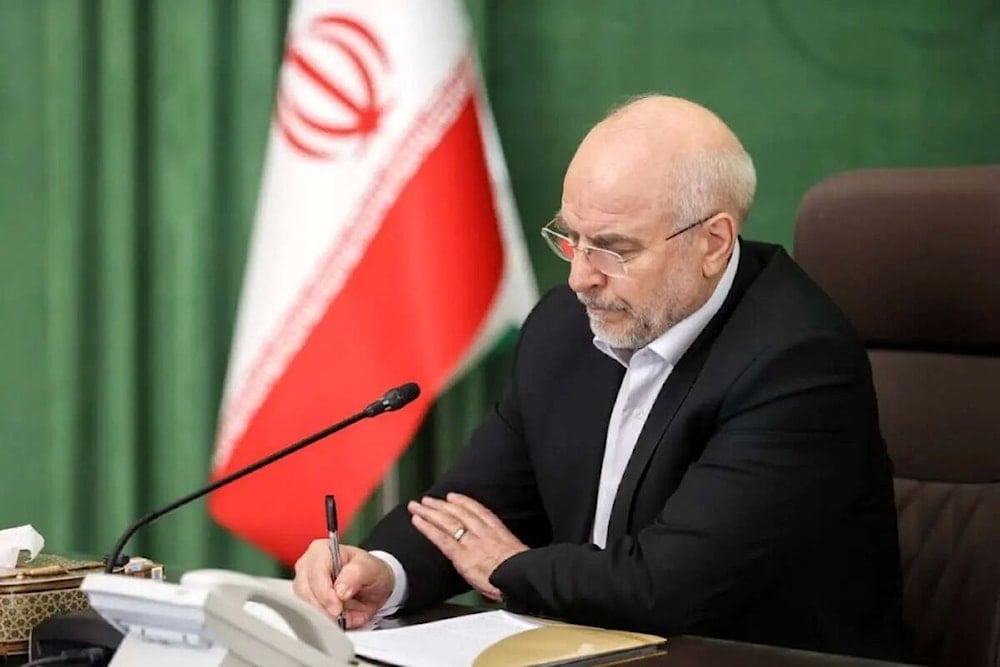'Israel' never faced such fire until 12-day war with Iran: Ghalibaf
Iranian Parliament Speaker Mohammad-Bagher Ghalibaf said "Israel" was overwhelmed by Iran's response during the 12-day war, forcing it to seek a ceasefire amid broader US-backed attempts to undermine Iran's stability.
-

Iranian Parliament Speaker Mohammad Bagher Ghalibaf (IRNA)
Iranian Parliament Speaker Mohammad-Bagher Ghalibaf on Thursday said that "the Zionist entity has never tasted fire since its creation the way it did during the 12-day war," stressing that the scale of Iran’s retaliatory response forced the Israeli occupation, in the final days of the confrontation, to urgently press for a ceasefire.
The conflict erupted at a highly sensitive moment, coinciding with nuclear negotiations between Tehran and Washington. Iran maintains that "Israel" exploited US setbacks in the talks and launched its aggression in an attempt to provoke Tehran and shift the strategic equation.
Ghalibaf noted that, despite Israeli and American attempts to pressure Iran militarily and economically, the country’s scientific independence remains unshakable. He said that Iran’s mastery of advanced technologies, including nuclear science, is far more crucial than the mere production of centrifuges, praising the Iranian scientists who achieved this autonomy. He reaffirmed that Iran will safeguard these capabilities and continue advancing them regardless of external threats or sabotage attempts.
Sabotage Thwarted
His comments came as Iran’s Islamic Revolutionary Guard Corps (IRGC) Intelligence Organization announced that it had uncovered and dismantled a sabotage network operating inside the country "under the direction of American and Israeli intelligence services." The network was identified after extensive surveillance and coordinated intelligence operations conducted across multiple provinces. According to Iranian authorities, the dismantling of the group thwarted a series of planned operations targeting public security and critical infrastructure.
The IRGC stated that the Israeli occupation, acting as the regional arm of the United States, shifted its strategy toward internal destabilization after its military failure in the 12-day war. Having been unable to withstand Iran’s direct response, and faced with internal panic and strategic confusion, Tel Aviv resorted to covert sabotage and disinformation campaigns designed to create instability inside Iran. The organization said that Israeli-linked cells were tasked with fomenting unrest during the second half of the autumn period, but these plans were neutralized before they could materialize.
Threat Neutralized
Iranian security officials confirmed that all operatives connected to the network have been arrested, with investigations ongoing. They stressed that the operation is part of a broader, long-term campaign to confront espionage and infiltration attempts orchestrated by the United States and its Israeli proxy. Over recent months, intensified counter-intelligence monitoring led to a series of precise arrests targeting groups accused of coordinating with the Israeli occupation, running disinformation networks, and attempting to incite public disorder.
Tehran states that these security achievements demonstrate "Israel’s" deepening strategic frustration following the 12-day war, as well as the failure of Washington’s pressure campaign. Instead of weakening Iran, officials say, these efforts have strengthened Iran’s internal security posture while exposing the extent of foreign interference aimed at undermining the country’s stability.
Read more: Exclusive: Al Mayadeen obtains IAEA report on Iran’s nuclear program

 3 Min Read
3 Min Read










